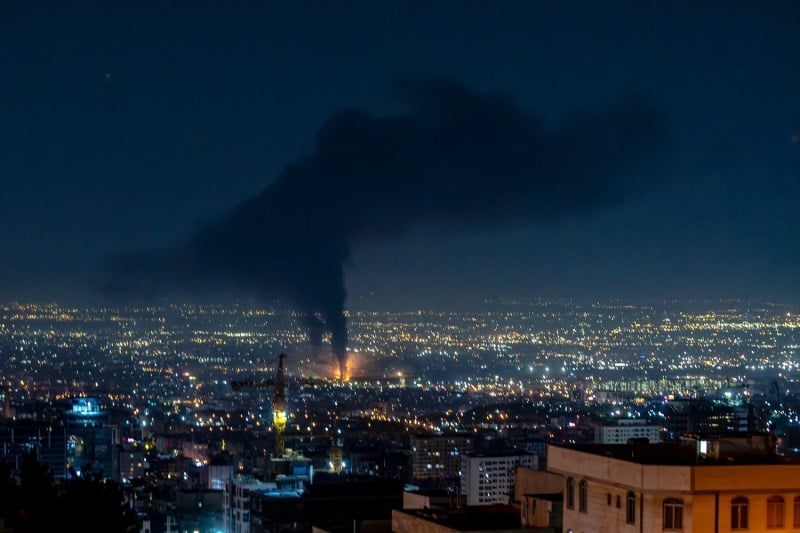Israel Can’t Be a Hegemon

Israel Can’t Be a Hegemon
The Israeli government is making a bid for regional dominance that’s unlikely to succeed.
Israel’s Prime Minister Benjamin Netanyahu speaks in front of a map of the Middle East during a press conference at the Government Press Office (GPO) in Jerusalem on September 4, 2024. ABIR SULTAN / POOL / AFP
Israel’s far-reaching attack on Iran is the latest round in its campaign to eliminate or degrade every one of its regional opponents. In the wake of the Hamas attack in October 2023, it has waged a brutal campaign to destroy the Palestinian people as a meaningful political force, an effort that has been described as a genocide by leading human rights organizations and numerous academic experts. It has decimated the leadership of Hezbollah in Lebanon through airstrikes, booby-trapped cellphones, and other means. It has attacked the Houthis in Yemen and bombed post-Assad Syria to destroy weapons caches and prevent forces it sees as dangerous from exercising political influence there. And the latest attacks on Iran aim to do more than just damage or destroy that country’s nuclear infrastructure. At a minimum, Israel wants to end the negotiations over Iran’s nuclear program; cripple Iran’s ability to respond by killing top Iranian leaders, military officials, diplomats, and scientists; and, if possible, drag the United States deeper into the war. At a maximum, it hopes to weaken the regime to the point where it collapses.
Given that each of these actions has been at least partially successful—at least in the short term—should we now think of Israel as a regional hegemon? If such a state is defined as “the sole great power within a particular region,” such that “no other states (or combination of states) could mount a serious defense in an all-out test of military strength,” does Israel now qualify? If so, should we also expect its neighbors to act as others have when facing a hegemon: “recognize its superior power and defer to it on matters of vital interest to the hegemon”?
Israel’s far-reaching attack on Iran is the latest round in its campaign to eliminate or degrade every one of its regional opponents. In the wake of the Hamas attack in October 2023, it has waged a brutal campaign to destroy the Palestinian people as a meaningful political force, an effort that has been described as a genocide by leading human rights organizations and numerous academic experts. It has decimated the leadership of Hezbollah in Lebanon through airstrikes, booby-trapped cellphones, and other means. It has attacked the Houthis in Yemen and bombed post-Assad Syria to destroy weapons caches and prevent forces it sees as dangerous from exercising political influence there. And the latest attacks on Iran aim to do more than just damage or destroy that country’s nuclear infrastructure. At a minimum, Israel wants to end the negotiations over Iran’s nuclear program; cripple Iran’s ability to respond by killing top Iranian leaders, military officials, diplomats, and scientists; and, if possible, drag the United States deeper into the war. At a maximum, it hopes to weaken the regime to the point where it collapses.
Given that each of these actions has been at least partially successful—at least in the short term—should we now think of Israel as a regional hegemon? If such a state is defined as “the sole great power within a particular region,” such that “no other states (or combination of states) could mount a serious defense in an all-out test of military strength,” does Israel now qualify? If so, should we also expect its neighbors to act as others have when facing a hegemon: “recognize its superior power and defer to it on matters of vital interest to the hegemon”?
At first glance, this possibility seems far-fetched. How can a country with fewer than 10 million people (only about 75 percent of whom are Jews) possibly dominate a vast region containing several hundred million mostly Muslim Arabs, plus more than 90 million Persians?
The idea seems more plausible, however, when one considers that Israel has many advantages over its neighbors. Its citizens are better educated and highly patriotic and have usually been guided by more effective leaders than their Arab counterparts. Israel gets generous and steadfast support from a wealthy and politically influential diaspora, and in the past received invaluable assistance from major powers such as Great Britain and France. Most of its Arab rivals have faced a variety of internal schisms, upheavals, or coups, and they have been divided by inter-Arab rivalries.
Moreover, because modern military power depends more on technological mastery, training, and skillful command than on sheer numbers, the Israel Defense Forces (IDF) has always been far more capable than the forces it fought against. That advantage has grown as warfare has become increasingly reliant on expensive and highly sophisticated weaponry. Although both Hezbollah and Hamas became more capable over time, neither was ever able to threaten Israel’s existence or match the amount of damage that Israel could inflict on them. Israel’s sizable arsenal of nuclear weapons and vaunted intelligence capabilities reinforced its position even more.
Most important of all, Israel gets vast and largely unconditional support from the United States, whose government backs it no matter what it does and is formally committed to maintaining Israel’s “qualitative military edge.” Without that assistance, those roughly 10 million Israelis would be able to defend their own territory—remember, they have nuclear weapons—but have little chance of dominating the surrounding region.
Given all the above, the notion of Israel dominating the greater Middle East is not quite so ludicrous. Yet it would be a mistake to regard Israel as a true regional hegemon.
First, a regional hegemon is so powerful relative to its neighbors that it no longer faces any significant security threats from them and doesn’t even have to worry that a genuine rival will emerge any time soon. That is the position the United States had achieved by the dawn of the 20th century: The other great powers had withdrawn from the Western Hemisphere and no country or combination in the region could come close to matching America’s combination of economic might and military potential. With the brief exception of the Cuban missile crisis—which involved an external power (the Soviet Union) sending nuclear-armed missiles into the hemisphere—the United States has not faced a significant military challenge from within the hemisphere since the late 19th century. This privileged position allowed Washington to focus its foreign and defense policies on Eurasia, with the aim of preventing any other power from achieving a similar position within any strategically significant region.
Israel today does not meet that standard. The Houthis are still defiant, for example, and the IDF is still bogged down in Gaza despite having unleashed vast destruction on its inhabitants. Israel has significantly weakened Hezbollah and Hamas, but these were non-state actors and neither ever posed an existential threat to Israel’s existence. No Arab state or coalition is a match for Israel today, but both Turkey and Iran have significant military forces and much larger populations, and each could mount a credible defense in the event of all-out war, even if it ultimately lost, which in turn means that Israel cannot leave them out of its calculations or assume that these states will defer to it. Iran’s continued resistance makes that clear: Its retaliation for the recent attacks has been less than the damage it has suffered but far from trivial, and the conflict is not over. There is no sign that Tehran will willingly subordinate its interests to Israel, even if it ends up on the losing side of this latest encounter. For that reason alone, Israel is not a regional hegemon.
Moreover, the entire justification for these latest attacks was the fear that Iran might one day acquire nuclear weapons. The risk was not that Iran would use a bomb to attack Israel—which would be suicidal—but rather that an Iranian bomb would limit Israel’s ability to use force in the region with impunity. That Israel’s leaders saw that possibility of having to act with greater restraint as a danger reveals that they do not have the kind of “free security” that the United States—the world’s only true regional hegemon—has long enjoyed.
Nor have Israel’s recent battlefield successes solved the more fundamental issue of the Palestinians who make up roughly half the population in the lands Israel controls. Israel’s superior military and intelligence capabilities did not prevent Hamas from killing hundreds of Israelis in October 2023, and Israel killing more than 55,000 Palestinians in response hasn’t brought it closer to a political solution to this conflict. Instead, it has tarnished Israel’s global image significantly and undermined support even among long-standing allies.
Most important of all, Israel remains critically dependent on its American patron, which supplies most of the aircraft, bombs, and missiles it needs to attack its neighbors along with constant diplomatic protection. A true regional hegemon doesn’t have to rely on others to dominate its neighborhood, but Israel does. U.S. support has been ironclad for decades, due to the influence of a powerful domestic interest group, but the relationship has shown signs of strain in recent years and is likely to become more difficult to sustain as America’s own power position declines. And if this latest round of fighting eventually drags the United States in, more Americans—including MAGA faithful who thought U.S. President Donald Trump would keep the country at peace—will recognize the considerable price Americans keep paying for the “special relationship.”
Finally, durable regional hegemony requires the neighboring countries to accept (and in some cases welcome) the hegemon’s dominant position. Otherwise, the hegemon will constantly worry about renewed opposition and be forced to take repeated actions to prevent it from emerging. To make its privileged position acceptable to others, a durable hegemon must act with a degree of forbearance, as former U.S. President Franklin D. Roosevelt did by adopting his “Good Neighbor” policy toward Latin America. It is worth remembering that would-be regional hegemons like Napoleonic France, Nazi Germany, or Imperial Japan achieved a dominant position temporarily, but they were unable to consolidate their initial gains and eventually succumbed to more powerful opposing coalitions.
Treating neighbors with forbearance has not been Israel’s strong suit, however, and the growing influence of right-wing forces and religious extremists in the country makes that even less likely. Put all this together, and Israel falls well short of being a regional hegemon. I have no doubt that its leaders might like to achieve that status—why wouldn’t they—but it will remain forever beyond their reach. And that means that long-term security for the state of Israel ultimately depends on achieving an enduring political settlement with its neighbors, including the Palestinians. Which is yet another reminder that it is politics, not power alone, upon which lasting security ultimately depends.
Stephen M. Walt is a columnist at Foreign Policy and the Robert and Renée Belfer professor of international relations at Harvard University. Bluesky: @stephenwalt.bsky.social X: @stephenwalt
Stories Readers Liked
Iran-Israel Conflict
Analysis and reporting

How the Israel-Iran War Might End
Scenarios include an Iranian defeat, an Israeli retreat—or an expanded regional conflict.




















Join the Conversation
Commenting is a benefit of a Foreign Policy subscription.
Subscribe
Subscribe
Already a subscriber?
.
View Comments
Join the Conversation
Join the conversation on this and other recent Foreign Policy articles when you subscribe now.
Subscribe
Subscribe
Not your account?
View Comments
Join the Conversation
Please follow our comment guidelines, stay on topic, and be civil, courteous, and respectful of others’ beliefs.
View Comments
Change your username |
Log out
Change your username:
CANCEL
Confirm your username to get started.
The default username below has been generated using the first name and last initial on your FP subscriber account. Usernames may be updated at any time and must not contain inappropriate or offensive language.